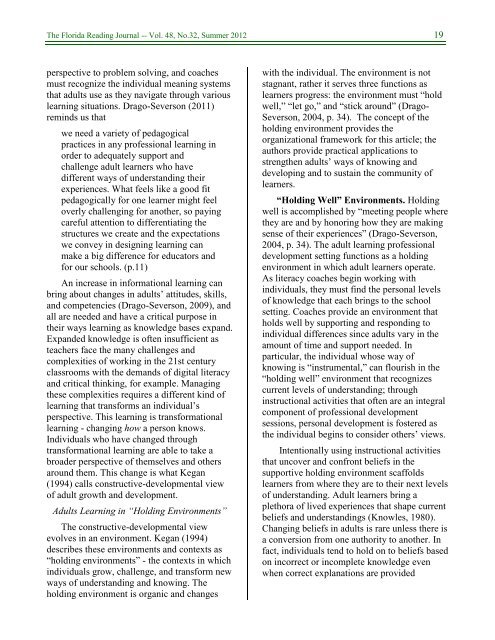PDF (Adobe Reader) - Florida Reading Association
PDF (Adobe Reader) - Florida Reading Association
PDF (Adobe Reader) - Florida Reading Association
You also want an ePaper? Increase the reach of your titles
YUMPU automatically turns print PDFs into web optimized ePapers that Google loves.
The <strong>Florida</strong> <strong>Reading</strong> Journal -- Vol. 48, No.32, Summer 2012 19<br />
perspective to problem solving, and coaches<br />
must recognize the individual meaning systems<br />
that adults use as they navigate through various<br />
learning situations. Drago-Severson (2011)<br />
reminds us that<br />
we need a variety of pedagogical<br />
practices in any professional learning in<br />
order to adequately support and<br />
challenge adult learners who have<br />
different ways of understanding their<br />
experiences. What feels like a good fit<br />
pedagogically for one learner might feel<br />
overly challenging for another, so paying<br />
careful attention to differentiating the<br />
structures we create and the expectations<br />
we convey in designing learning can<br />
make a big difference for educators and<br />
for our schools. (p.11)<br />
An increase in informational learning can<br />
bring about changes in adults‟ attitudes, skills,<br />
and competencies (Drago-Severson, 2009), and<br />
all are needed and have a critical purpose in<br />
their ways learning as knowledge bases expand.<br />
Expanded knowledge is often insufficient as<br />
teachers face the many challenges and<br />
complexities of working in the 21st century<br />
classrooms with the demands of digital literacy<br />
and critical thinking, for example. Managing<br />
these complexities requires a different kind of<br />
learning that transforms an individual‟s<br />
perspective. This learning is transformational<br />
learning - changing how a person knows.<br />
Individuals who have changed through<br />
transformational learning are able to take a<br />
broader perspective of themselves and others<br />
around them. This change is what Kegan<br />
(1994) calls constructive-developmental view<br />
of adult growth and development.<br />
Adults Learning in “Holding Environments”<br />
The constructive-developmental view<br />
evolves in an environment. Kegan (1994)<br />
describes these environments and contexts as<br />
“holding environments” - the contexts in which<br />
individuals grow, challenge, and transform new<br />
ways of understanding and knowing. The<br />
holding environment is organic and changes<br />
with the individual. The environment is not<br />
stagnant, rather it serves three functions as<br />
learners progress: the environment must “hold<br />
well,” “let go,” and “stick around” (Drago-<br />
Severson, 2004, p. 34). The concept of the<br />
holding environment provides the<br />
organizational framework for this article; the<br />
authors provide practical applications to<br />
strengthen adults‟ ways of knowing and<br />
developing and to sustain the community of<br />
learners.<br />
“Holding Well” Environments. Holding<br />
well is accomplished by “meeting people where<br />
they are and by honoring how they are making<br />
sense of their experiences” (Drago-Severson,<br />
2004, p. 34). The adult learning professional<br />
development setting functions as a holding<br />
environment in which adult learners operate.<br />
As literacy coaches begin working with<br />
individuals, they must find the personal levels<br />
of knowledge that each brings to the school<br />
setting. Coaches provide an environment that<br />
holds well by supporting and responding to<br />
individual differences since adults vary in the<br />
amount of time and support needed. In<br />
particular, the individual whose way of<br />
knowing is “instrumental,” can flourish in the<br />
“holding well” environment that recognizes<br />
current levels of understanding; through<br />
instructional activities that often are an integral<br />
component of professional development<br />
sessions, personal development is fostered as<br />
the individual begins to consider others‟ views.<br />
Intentionally using instructional activities<br />
that uncover and confront beliefs in the<br />
supportive holding environment scaffolds<br />
learners from where they are to their next levels<br />
of understanding. Adult learners bring a<br />
plethora of lived experiences that shape current<br />
beliefs and understandings (Knowles, 1980).<br />
Changing beliefs in adults is rare unless there is<br />
a conversion from one authority to another. In<br />
fact, individuals tend to hold on to beliefs based<br />
on incorrect or incomplete knowledge even<br />
when correct explanations are provided



